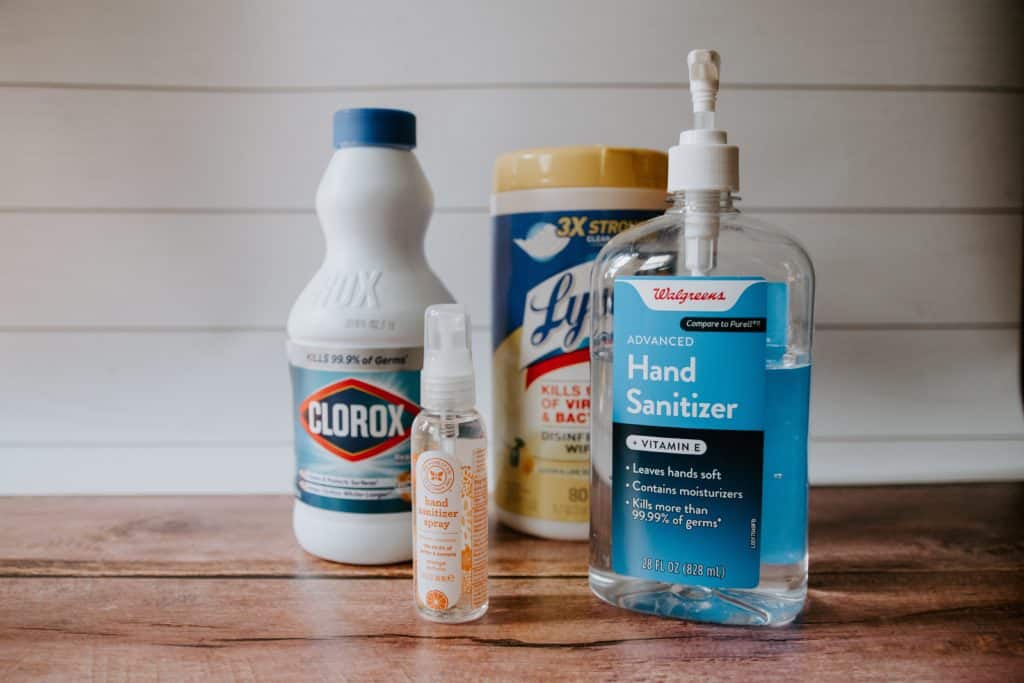What should you use to disinfect fish equipment and what is the safest way to use it? If you keep any fish you will have multiple tanks at some point, even just a simple hospital/quarantine tank at the ready. You may have adopted a new tank off the “FREE” Craigslist page and want to use it for your fish. If you only have one set of equipment, which you shouldn’t, how can you make sure it doesn’t move contaminants between systems? How can you make sure your new “FREE” tank is safe for fish?
Never use any of these disinfectants with fish in your system! Use to disinfect empty systems only!
Available Products to Disinfect Fish Equipment
Bleach
Specifically, liquid bleach is the name for sodium hypochlorite. It works to destroy bacteria and other pathogens by denaturing or destroying intercellular proteins. It has also been shown to affect heat shock proteins of cell walls, making them break. It can be mixed with chlorine or peroxide to create the typical bleaches you see on your store shelves.
Although a little hard on some types of equipment, bleach is an affordable and effective cleaning agent for fish systems. Use a 6 oz to 1 gallon of water and allow it to soak for 20-30 minutes. This will ensure it kills any potential Mycobacterium colonies.
Lysol®
The active ingredient in Lysol® is benzalkonium chloride. Lysol®’s “free and clear” line contains hydrogen peroxide instead. Benzalkonium chloride is a quaternary ammonium compound that dissolves the outer lipid layer of cell membranes, destroying bacteria and allowing easier penetration of other chemicals.
Lysol® is more effective against Mycobacterium than bleach. It does produce a very sudsy layer that is harder to rinse off and various scents that may be pleasing to you, but your fish will not appreciate. Although a spray application may be sufficient, it is recommended to soak all equipment in a water + Lysol® 1% bath for effective disinfection. You will determine your 1% solution based on the Lysol® concentration you purchase.
Virkon® Aquatic
This formulation, made up of potassium peroxymonosulfate-sodium chlorine, is made to work in aquaculture and is very safe for fish. Although great for the treatment of Aeromonas spp. and aquatic viruses, such as Koi Herpes Virus and Spring Virema of Carp, they are not effective against Mycobaterium.
It is the more expensive option of all the available aquatic disinfectants, but is the safest for use with fish. Use in a 1% solution to take care of most common aquatic pathogens.
Potassium Permanganate
Also known as “PP,” this “old school” pond nuke is commonly used by hobbyists. It acts as a strong oxidizing agent to destroy many cell types. Typical application will turn your bath purple or pink for a certain period of time. The pink/purple will turn to brown as the chemical is used up. Systems with lots of organic debris (i.e. your main biofiltration) will turn brown faster. Read here for more information on proper use.
Never apply potassium permanganate directly to your fish’s skin! Chemical burns have been reported in humans treated directly with PP. Do not subject your fish to this cruel treatment. Under the guidance from a veterinarian, certain wounds can be treated using a cloth soaked in a PP solution.
Anything else – don’t use it with fish
Other common laboratory disinfectants, including Micronex, Clidox-S, Roccal-D, Ethyl alcohol, Chloramine-T and Formalin have been tested for use in fish, but are not commonly available. The chemicals above more than cover any potential pathogen hobbyists should be in contact with.


Pingback: How To Sterilize A Fish Tank And Equipment - All You Need To Know
Pingback: How to clean fish tank equipment - Taunt On Water
Pingback: How to Create a Half Water, Half Land Fish Tank – CelestialPets